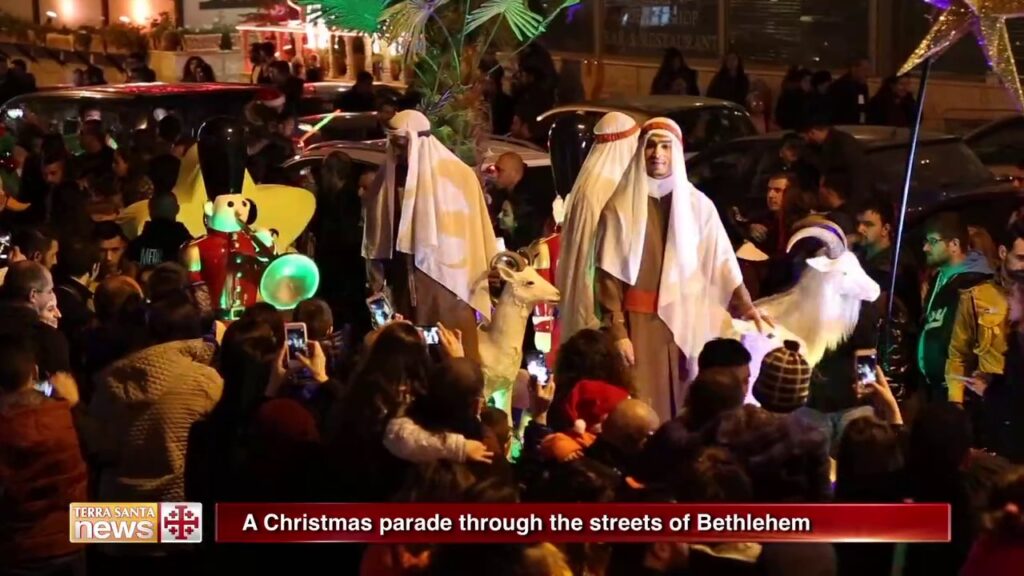As Christmas Looms, Christianity, Born of the Middle East, Loses More and More Arab Souls to Migration

By: John Mason / Arab America Contributing Writer
Many reasons account for why Christians have been driven away from the holy land. This is despite the fact that Christians were once a vital part of the Middle East landscape. While Christian monuments dot the Middle East landscape, many are unused, merely symbolic. Today, even Palestinian residents in the Middle East have difficulty reaching Christianity’s holy sites. Their travel to the holy land from Gaza is heavily restricted by Israeli authorities.
Status and Numbers of Middle East Christians in the Middle East Fading ,
Persecution against Christians, violence, and turmoil in the region, and poor economic conditions have driven the faithful away. At the extreme, Christians have been kidnapped, imprisoned, and even murdered simply due to their faith. Iraq, Syria, Lebanon, and Palestine, Christianity’s and its sister Abrahamic religions’ very birthplace, is where the faithful are most maltreated. Christian Arabs living in urban areas such as Haifa, Acre, and Jaffa were forced out of those cities during the 1948 founding of the state of Israel.
Middle Eastern Christians have played an important part in the history of the region. Typically, Christians have been productive economically, are well-educated and politically moderate. Today, Christians comprise only about 5% of the Middle East population. That percentage is down from around 20% in the early 20th century. Lebanon has the highest percentage of Christians, about 40%. Egypt is next, with approximately 10%, though it has the largest number, around 10 million Christian Copts.
| Middle East Countries Ranked by Percentage of Christians in the Population |
| 1 Lebanon 40.5% 2 Egypt 10.5% 3 Syria 10.2% 4 Jordan 6% 5 Israel 1.9% 6 Iraq 2.5% 7 Palestine 1.7% 8 Iran 0.35% 9 Turkey 0.2% |
Nearly one million Christians reside in Palestine, including the West Bank and Gaza. This is a mere 6% of the total population. They belong to the Greek Orthodox, Roman Catholic, Greek Catholic Syrian Orthodox, Lutheran and Armenian Orthodox churches. In Israel, Maronites along with Syriac Orthodox and Greek Catholic residents define themselves as Arameans or Arabs. Only 170,000 Christians today live in Israel, comprising a miniscule 1.9% of the total population of 8.9 million. Many Christians left East Jerusalem, the West Bank and Gaza following the 1967 Arab Israeli war.
Perhaps ironically, while Christian numbers are rapidly diminishing, a large number of Christian monuments, including churches, sepulchers, shrines, among other structures dot the Middle East. While some of these are in continued use, many are destroyed or there is too few remaining faithful to keep them running.
Loss of Christians as an Integral Part of the Middle East Pattern
Christians were once a vibrant element in the Middle East. Arriving on the scene seven centuries before the Muslims, Christians were an essential part of political, social, and economic life across the region. Christians used to be a vital energy in the Middle East. Even in more recent times, according to The New York Times, “They dominated Lebanon and filled top jobs in the Palestinian movement. In Egypt, they were wealthy beyond their number. In Iraq, they packed the universities and professions. Across the region, their orientation was a vital link to the West, a counterpoint to prevailing trends.”
In the context of a papal visit to the Middle East a decade or so ago, The Times reported, “Since it was here that Jesus walked and Christianity was born, the papal visit highlights a prospect many consider deeply troubling for the globe’s largest faith, adhered to by a third of humanity, its most powerful and historic shrines could become museum relics with no connection to those who live among them.”
Now a fact, the Middle East is predominantly Muslim. Israel is an exception, with seven million Jews. No other Middle Eastern country exists where Muslims do not outnumber Christians. Islam has gradually been replacing nationalism as the major impetus of how people identify politically. This has left Christians behind, no longer relevant to national politics. Unless secularism returns to Arab countries, Christians are increasingly consigned to a role of “enemy” or even “foreigner.”
Christmas for Middle Eastern Christians Not What it Used to be: Celebrating in the Holy Land
Muslims, Christians, and Jews in Jerusalem’s Old City generally get along. As they intermingle near the Muslim Quarter, interactions may intensify. This is where the Via Dolorosa meets El Wad Street, the access point to both al-Aqsa Mosque and the Western Wall. It is here where locals meet Christian and Muslim pilgrims.
“It’s not difficult to sort locals from pilgrims along that stretch of the Arab souk,” the National Review reported. “European Muslims and African Jews and Asian Christian pilgrim tourists visiting Jerusalem during the Christmas season have little meaningful contact with local Christians — much fewer Christians from the broader region.” When they do intermingle with locals, Israeli security looms large, mostly armed young Israeli men and women “no less diverse than those whom they guard. Sizing up your attire or complexion, they might ask your religion if you happen to turn down the wrong street at the wrong time of day.”
Middle East governments have forbidden Christians to travel to Jerusalem and other holy sites. The National Review reports, “Palestinian Christians in the territories have no special right of access but are permitted or denied entry to Jerusalem the same as their Palestinian neighbors.” Today, Israel is blocking Palestinian Christian travel from Gaza to holy sites on the West Bank and East Jerusalem. With its new right-wing government in place, Israel may impose even more restrictions on Palestinian pilgrimages to their holy places.
Only once there is true peace in the Middle East, when Palestinians have their own political space, will religious freedom be respected. Only then will Middle East Christians freely make their pilgrimages to their ancient, revered holy sites.
Sources:
–“Mideast’s Christians Losing Numbers and Sway,” The New York Times, 5/12/2009
–“Endure in the Middle East,” National Review, 11/13/2022
John Mason, PhD., who focuses on Arab culture, society, and history, is the author of LEFT-HANDED IN AN ISLAMIC WORLD: An Anthropologist’s Journey into the Middle East, New Academia Publishing, 2017. He has taught at the University of Libya, Benghazi, Rennselaer Polytechnic Institute in New York, and the American University in Cairo; John served with the United Nations in Tripoli, Libya, and consulted extensively on socioeconomic and political development for USAID and the World Bank in 65 countries.
Check out our Blog here!









